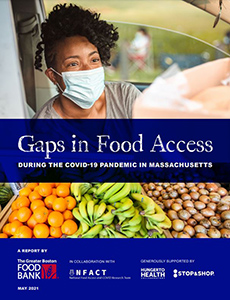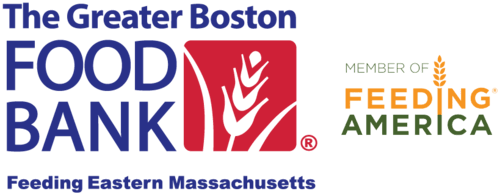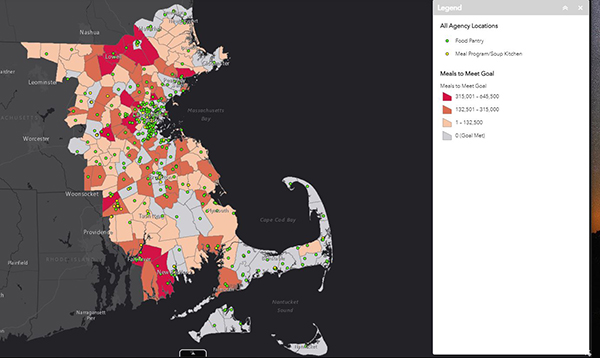Data and Research
The Greater Boston Food Bank (GBFB) conducts research and analyzes data on our operations, our network of hunger-relief partners, and our community in an effort to improve the effectiveness of how we fight food insecurity and improve public health in the Commonwealth. Our findings are used to guide GBFB’s strategy and to inform policy and advocacy at the local, state, and federal levels.
Closing the Meal Gap in Eastern Massachusetts
The map below features GBFB’s town-by-town progress toward our goal of distributing enough food to provide three meals per day for each food-insecure individual in Eastern Massachusetts.
Massachusetts Statewide Survey on Food Access and Food Insecurity
This survey, funded by the Hunger to Health Collaboratory and Stop & Shop, in collaboration with the National Food Access and COVID Research Team (NFACT), was undertaken to: 
1. Identify the prevalence of food insecurity
2. Identify gaps and disparities in food assistance use
3. Develop data-driven recommendations to ensure that all have adequate food
WATCH: A presentation on our “Gaps in Food Access in Massachusetts During COVID-19” report
An Overburdened Charitable Food System: Making the Case for Increased Government Support During the COVID-19 Crisis
Due to the COVID-19 pandemic, the number of people accessing our partner food pantry network doubled and our food distribution increased by 55%. Because of this increased need, GBFB is advocating for increased state and federal support for those facing food insecurity. Read more in our American Journal of Public Health editorial.
Health Center Program to Support Food Security Through Nutrition Coaching and Produce Markets (HC PRODUCE) Study
Since 2018, we have partnered with Cambridge Health Alliance to host a monthly produce distribution at the Cambridge Health Alliance Revere Care Center. Research is ongoing for quality improvement purposes and to evaluate the effectiveness of the program on improving diet. This work is funded in part by a SIREN grant and a Massachusetts Attorney General Office’s Social Determinants Partnership Grant. As part of this collaboration, we published Food access initiatives: An integral piece of the Revere, Massachusetts, COVID-19 response in the Journal of Agriculture, Food Systems, and Community Development.
Health-Related Costs of Hunger
GBFB sponsored the first study of the health-related costs of hunger and food insecurity in Massachusetts. Conducted by Children’s HealthWatch, and released in 2018, the in-depth analysis reports hunger and food insecurity in our state increased health-related expenditures by an estimated $2.4 billion at least, in 2016 alone. For more on the intersection of food insecurity and health, see Food As Medicine: Rethinking Hunger Relief As Health Care (WBUR, 2017).
Health & Research Council
The purpose of the Health & Research Council is to advise GBFB’s community-based research, programming, and policy work. GBFB relies on members of this Council to provide guidance on new developments and ideas in their relevant fields of expertise such as public health, public policy, and healthcare administration. Click here to learn about the members of GBFB’s Health & Research Council.
Additional Data & Research Resources
- Map the Meal Gap study (Feeding America)
- Food Insecurity Projections during COVID-19 (Feeding America)
- Key Drivers to Improve Food Security and Health Outcomes (Feeding America)
- Analysis of Census Household Pulse Data (Northwestern’s Institute for Policy Research)
- Voices from the Field – A Case Study Series: Food is Medicine During COVID-19 (Food Is Medicine Massachusetts)
- Boston Indicators

